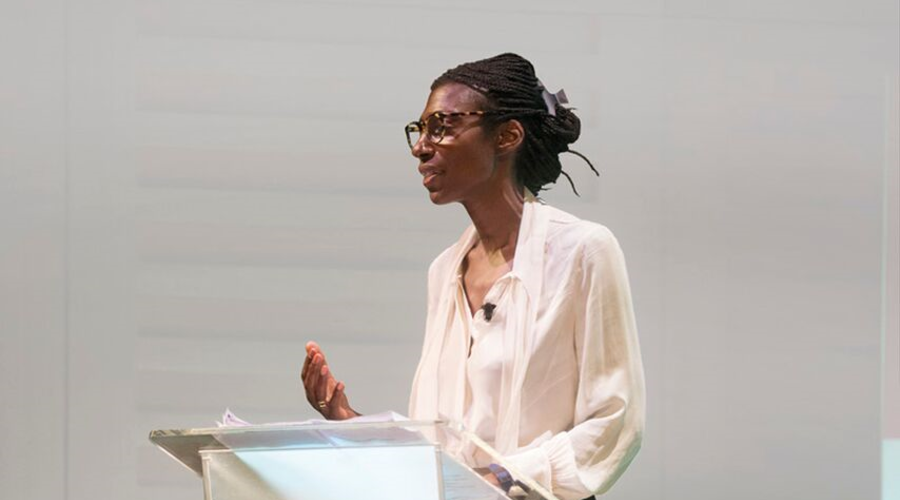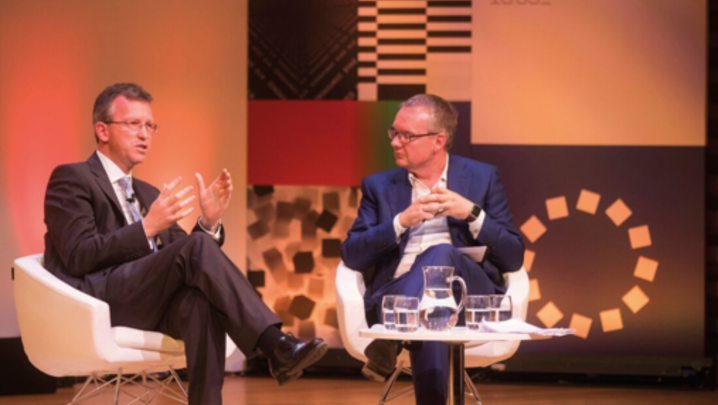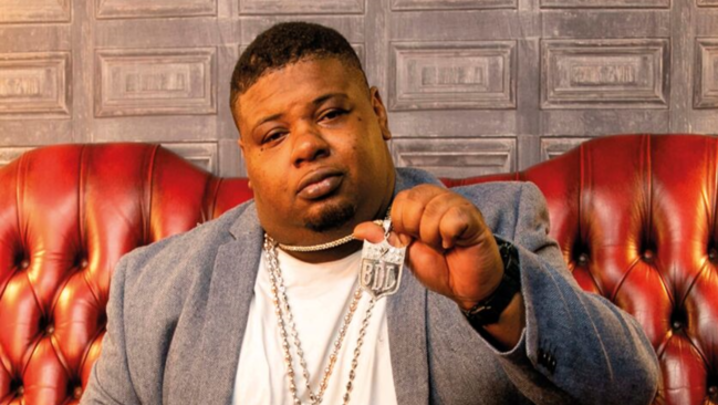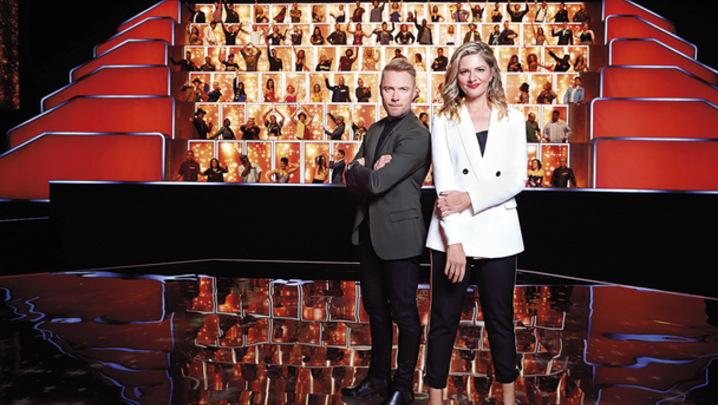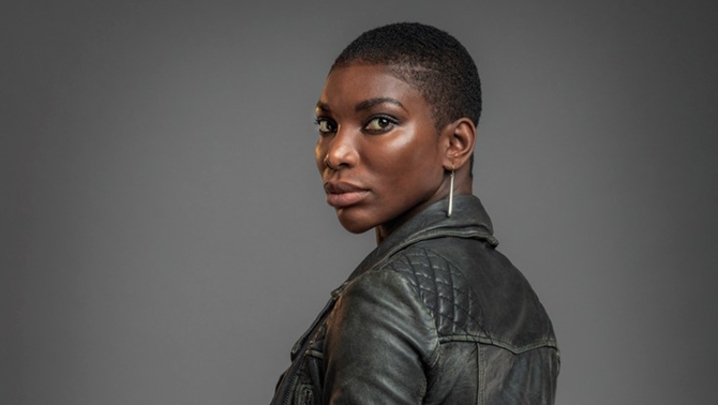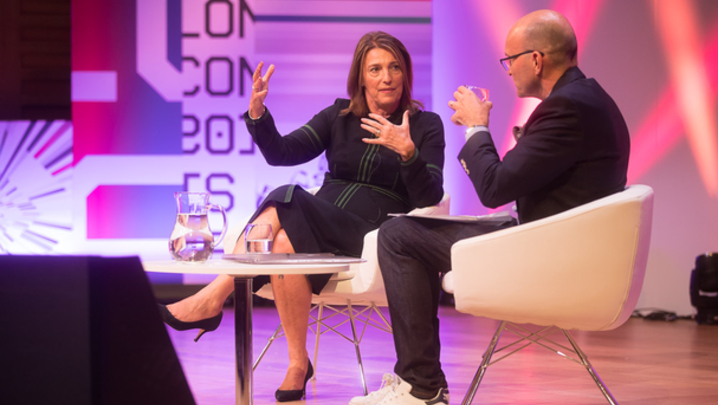Ofcom CEO Sharon White examines what lessons from regulating TV could be applied to police the internet. Steve Clarke takes notes
Earlier in the day, several speakers had drawn attention to how their tightly regulated organisations and companies were forced to compete with the generally unregulated Faangs. They called for a level playing field – but taming the internet will be an enormous challenge for policymakers and politicians.
Now it was the turn of Ofcom CEO Sharon White, described by her interviewer, Kirsty Wark, as probably one of the UK’s hardest-working public servants.
The former Treasury official used her speech to examine whether lessons from broadcast regulation could be applied to disciplining the domain dominated by Google and Facebook.
The British Government was considering legislation to address “online harm”, she said. The growth in online services “has been fuelled by a free and open internet, unencumbered by most of the rules and regulations that apply offline.…
"But we see growing evidence that, for all its undoubted benefits, that growth has come at a price.” Four out of five adult internet users have concerns about going online, according to joint research by Ofcom and the Information Commissioner’s Office.
“Some of those concerns relate to areas like hacking or privacy,” said White. “But the most common, raised by two-thirds of people, relate to content – particularly when aimed at children. Some 12 million people using the internet have personally experienced online content or conduct that they found harmful.
“All of us care about this – whether as parents, programme-makers, policy-makers or regulators. France and Germany have passed legislation. Here, too, as the Government prepares its white paper, internet safety is a matter of urgent debate across the major parties.
“In July, the DCMS select committee completed its interim report on disinformation and fake news. Among other things, it looked at the principles that should apply to future regulation.
“Content could be harmful because it is illegal, dangerous, misleading or inappropriate for its audience. And it can be delivered in many forms – from TV-like programmes, to videos, images and text.
"Often these are served up at the same time, on a single screen. And different rules apply, depending on the mode of delivery.”
Ofcom, she said, was “very conscious of the growing disparity between the safeguards that everyone in this room is required to observe when making traditional TV programmes, and the much more limited ones that apply elsewhere”.
She illustrated her point by considering the viewing of a typical British child, who spends around 90 minutes a day watching broadcast TV, and more than that on her phone or the internet.
The protection afforded to her, by a complex set of regulations, varies depending on the service that she happens to be looking at.
Viewing, say, Absolutely Fabulous on TV, the show “must abide by a range of detailed rules covering areas such as crime, sex, drugs, language, violence and self-harm”.
But enjoying the same episode of the classic sitcom via Netflix or catch-up, the regulations were “more limited to a set of standards under general European law. For example, there are rules on violence, but nothing on swearing. Patsy is off the leash.”
She continued: “If our typical child picks up her phone to watch a clip of the same show on Facebook or YouTube, there is no regulation at all, beyond the general law to protect her from harmful content.
“The broadcasting and online worlds are competing under different conditions, even as the online world takes up an ever greater share of our time. This has profound consequences for viewers, especially for children, who may well not distinguish between the two.
“Without even knowing it, viewers are watching the same content, governed by different regulation in different places, or by none at all. This is a standards lottery.”
There were “welcome signs that the technology giants are increasingly alive to their responsibilities. Facebook and YouTube are hiring around 30,000 content moderators this year.
“But trust in them is already weakening. Our research shows that people see social platforms as the single biggest source of online harm and most people want the rules to be tighter.
“The role of regulators is evolving, too. New European laws will give national regulators some oversight of video-sharing platforms, requiring companies such as YouTube to address child harm, terrorism and hate speech.
“But most online content will remain unregulated, including words and images on social media, and videos that aren’t on sharing platforms.
“The UK Government is already considering how to level that playing field. And the DCMS Committee has suggested that broadcasting standards, as defined by Parliament and implemented by Ofcom, should provide the basis for setting standards online.”
The answer was “not simply to transplant traditional broadcast regulation, unamended, into the online corpus. Clearly, the internet is fundamentally different from television and radio in its nature, audience and scale.
“The sheer volume of text, audio and video that is generated or shared online far outstrips the output of traditional media.”
It could be “impractical to review platforms’ decisions about content case-by-case. Most online content is moderated after it is published. There are no producers or compliance teams checking it beforehand. So sanctioning platforms for every undesirable post that gets online might not be practical or effective.”
Evidence suggested, she said, “that people see the internet quite differently to television. On TV, viewers value impartiality in news, and want to see that guaranteed.
"But when they go online, they are content to pick from a wealth of different views, often one-sided and opinionated. On an individual level, the internet is an unrivalled tool for people to express their views.
"If regulation is too blunt, it could undermine freedom of expression.
“Can these hurdles be overcome? Based on our experience, we believe they can.” She proposed that four broad lessons could be relevant:
Present broadcasting regulation started with a clear set of aims. The industry was held to high standards “by a clearly articulated set of rules that evolves with public opinion”.
Far from undermining freedom of expression, effective regulation could promote it. “Parliament has shown the way, by requiring regulation to balance strong audience protections with the broadcasters’ right to transmit ideas, and people’s right to receive a variety of views.”
How to deal with the volume of unmoderated online content? “One approach that has worked well in our arena is to regulate companies’ complaints processes, as we do with telecoms firms. Companies are penalised not for the harm itself, but for their failure to address it quickly and effectively.
“As in Germany, this could mean requiring tech giants to be much more transparent about how they tackle online harm. Likewise, people expect regulators to be equally transparent about the reasons and evidence for their decisions. And to impose meaningful sanctions to deter poor behaviour.”
Finally, “in broadcasting, independence has proved fundamental to the regulator working in the interests of audiences, free from commercial or political influence. It helps ensure credibility in the system, and builds public trust.”
On the question of exactly how regulation might be applied, and by whom, White said that Ofcom was agnostic: “Those, rightly, are matters for government and Parliament to decide.”
The Ofcom chief had delivered her speech. It was now time for Wark to dissect the implications. If the Government asked Ofcom to regulate the internet, would the regulator do it? “We’re not seeking any powers,” White replied.
“We’ve got quite a big job as it is. What we’re trying to do is point out that there are some principles from the broadcasting world that could be relevant.
"The matter for institutional arrangements is clearly something for government.”
Do the tech giants have the ability to police themselves? And how helpful is the German model? “Our research tells us that the public are concerned about consistency, uniformity and transparency,” said the Ofcom CEO. “What the tech giants have started to do in the last year [regarding self-regulation] is not reflected in growing confidence – trust has gone down.
“That’s why Germany is an interesting example, partly because it shows that something practically can be put in place. What’s also very interesting is they’ve focused on… the transparency of the process.
“So, when the tech giants say they have taken down a certain amount of content, with a certain amount of speed, are they doing so? There are effective sanctions if they don’t.”
But, pressed Wark, are there really enough people who understand how to police the internet to do so?
“The market changes in all sorts of new ways. We’re all developing that expertise,” said White. “At Ofcom, our core job is to protect audiences and to ensure that we’ve all got great programming to watch.
“We have seen such a dramatic shift, particularly among young people, that they don’t know what the television is. They watch mainly through catch-up or YouTube.
“We are deepening our understanding [but] whether we really understand the commercial pulses of the tech companies, as opposed to how viewers are shifting their habits in the UK, is a very good question….
“We’re consulting at the moment on prominence and particularly on whether there might be practical ways to introduce prominence if the Government decides to regulate the online world.”
Ofcom supports UK broadcasters collaborating in order to compete more effectively with the digital giants. In particular, it would back a British SVoD service run jointly by Britain’s PSBs. “With the benefit of hindsight, it was a mistake for the Competition Authority to rule against Project Kangaroo,” opined White.
“We want to signal very strongly that the PSBs are stronger together.”
She added: “Personally, I am very confident about the future of the BBC and the future of British TV, because the quality is there. All our audience research shows that people want to see British TV reflecting the diversity and breadth of the UK.
“For all the glory of Netflix and the other steamers, they are directed at global audiences.”
In Session Eleven, Sharon White, CEO of Ofcom, was interviewed by Kirsty Wark, journalist, broadcaster and writer. The producers were Sue Robertson and Martin Stott.

